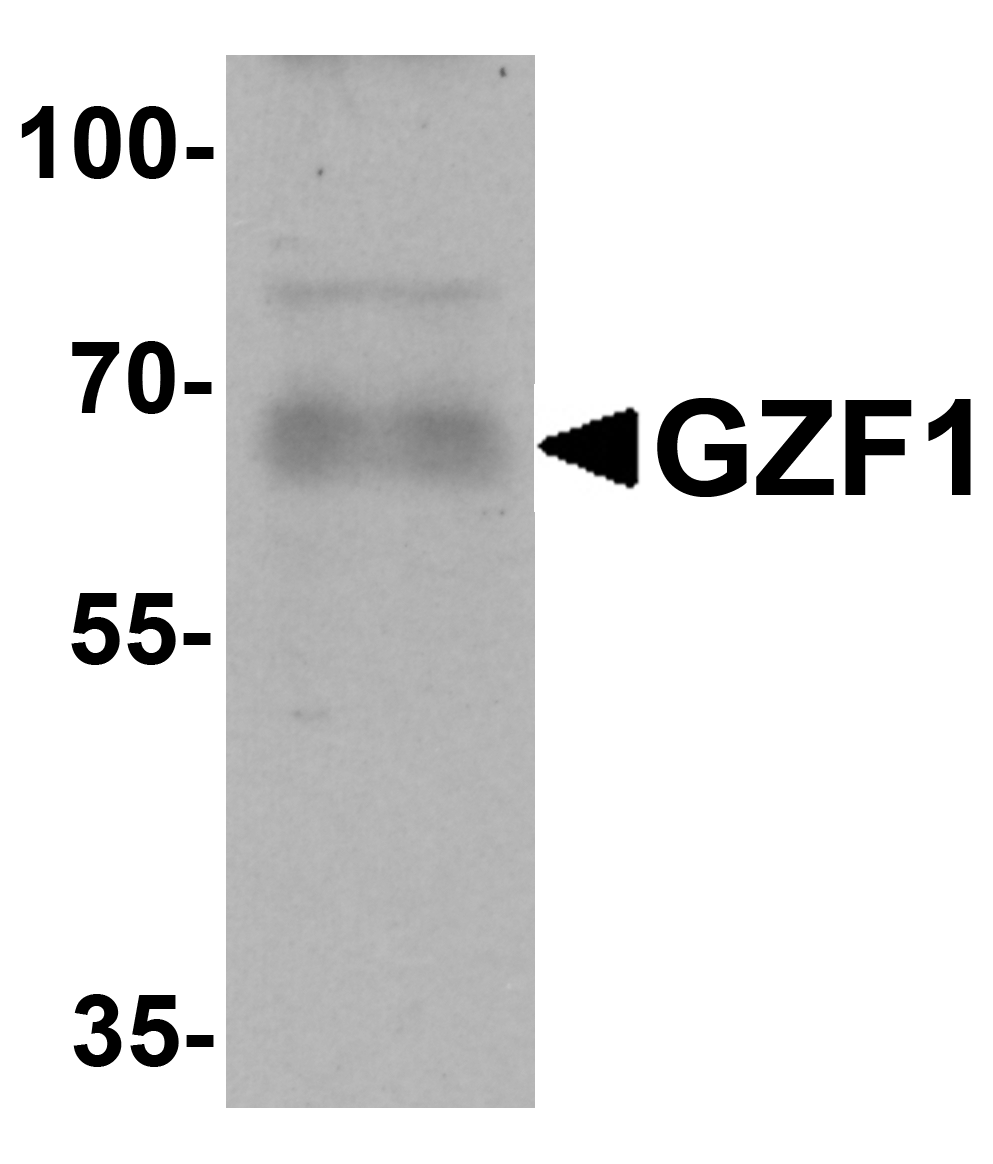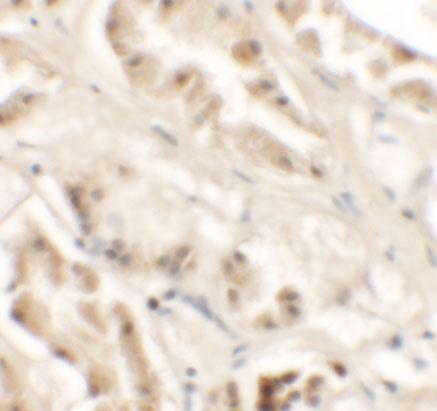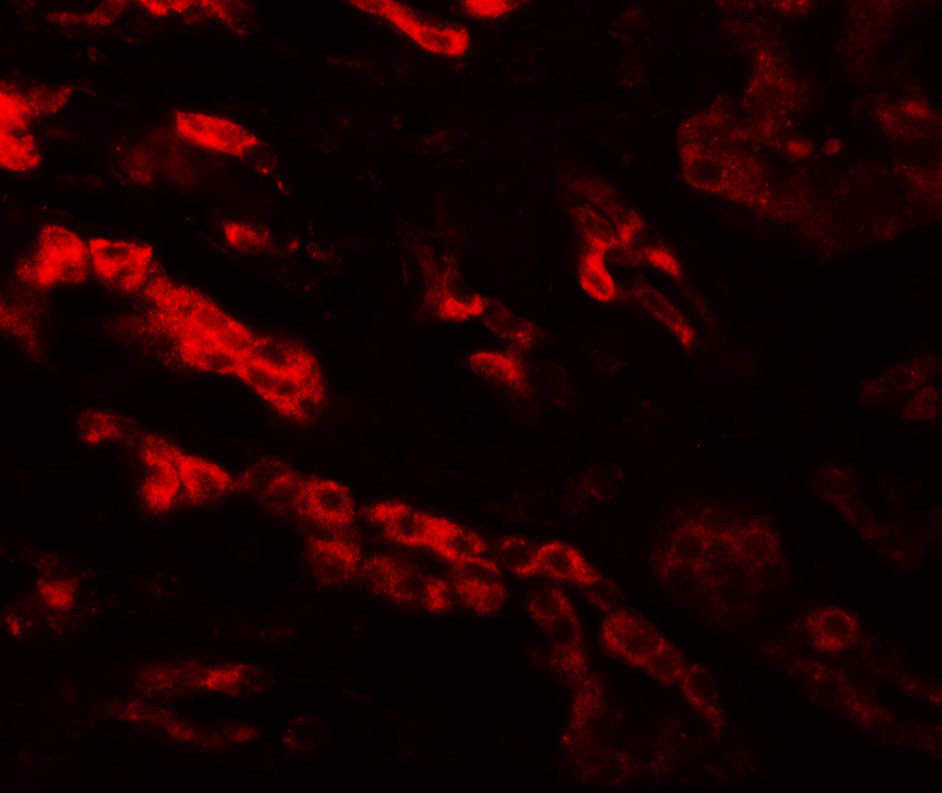GZF1 Antibody
| Code | Size | Price |
|---|
| PSI-6793-0.02mg | 0.02mg | £150.00 |
Quantity:
| PSI-6793-0.1mg | 0.1mg | £449.00 |
Quantity:
Prices exclude any Taxes / VAT
Overview
Host Type: Rabbit
Antibody Isotype: IgG
Antibody Clonality: Polyclonal
Regulatory Status: RUO
Applications:
- Enzyme-Linked Immunosorbent Assay (ELISA)
- Immunofluorescence (IF)
- Immunohistochemistry (IHC)
- Western Blot (WB)
Images
Documents
Further Information
Additional Names:
GZF1 Antibody: ZBTB23, ZNF336, ZBTB23, GDNF-inducible zinc finger protein 1, Zinc finger and BTB domain-containing protein 23
Application Note:
GZF1 antibody can be used for detection of GZF1 by Western blot at 1 μg/mL. Antibody can also be used for immunohistochemistry starting at 2.5 μg/mL. For immunofluorescence start at 2.5 μg/mL.
Antibody validated: Western Blot in human samples; Immunohistochemistry in human samples and Immunofluorescence in human samples. All other applications and species not yet tested.
Antibody validated: Western Blot in human samples; Immunohistochemistry in human samples and Immunofluorescence in human samples. All other applications and species not yet tested.
Background:
GZF1 Antibody: The GDNF-inducible zinc finger protein 1 (GZF1) is a sequence-specific transcriptional repressor with a BTB/POZ domain and ten zinc finger motifs whose expression is required for renal branching morphogenesis during kidney development. GZF1 binds to the 5'regulatory region of the homeodomain protein HOXA10, suggesting that GZF1 may play a role in morphogenesis other than kidney development. Recent experiments have indicated that GZF1 associates with nucleolin and this association is mediated by the first four zinc finger motifs of GZF1. It is thought that Nucleolin modulates the subcellular localization of GZF1 as well as its transcriptional repressor activity.
Background References:
- Fukuda N, Ichihara M, Morinaga T, et al. Identification of a novel glial cell line-derived neurotrophic factor-inducible gene required for renal branching morphogenesis. J. Biol. Chem. 2003; 278:50386-92
- Morinaga T, Enomoto A, Shimono Y, et al. GDNF-inducible zinc finger protein 1 is a sequence-specific transcriptional repressor that binds to the HOXA10 gene regulatory region. Nuc. Acids Res. 2005; 33:4191-201.
- Dambara A, Morinaga T, Fukuda N, et al. Nucleolin modulates the subcellular localization of GDNF-inducible zinc finger protein 1 and its roles in transcription and cell proliferation. Exp. Cell Res. 2007; 313:3755-66.
Buffer:
GZF1 Antibody is supplied in PBS containing 0.02% sodium azide.
Concentration:
1 mg/mL
Conjugate:
Unconjugated
DISCLAIMER:
Optimal dilutions/concentrations should be determined by the end user. The information provided is a guideline for product use. This product is for research use only.
Homology:
Predicted species reactivity based on immunogen sequence: Mouse: (89%), Rat: (89%)
Immunogen:
GZF1 antibody was raised against an 18 amino acid synthetic peptide near the carboxy terminus of human GZF1.
The immunogen is located within amino acids 600 - 650 of GZF1.
The immunogen is located within amino acids 600 - 650 of GZF1.
NCBI Gene ID #:
64412
NCBI Official Name:
GDNF-inducible zinc finger protein 1
NCBI Official Symbol:
GZF1
NCBI Organism:
Homo sapiens
Physical State:
Liquid
Protein Accession #:
NP_071927
Protein GI Number:
11968150
Purification:
GZF1 Antibody is affinity chromatography purified via peptide column.
Research Area:
Stem Cell
SPECIFICITY:
GZF1 antibody is human specific. At least four isoforms of GZF1 are known to exist.
Swissprot #:
Q9H116
User NOte:
Optimal dilutions for each application to be determined by the researcher.
Related Products
| Product Name | Product Code | Supplier | GZF1 Peptide | PSI-6793P | ProSci | Summary Details | |||||||||||||||||||||||||||||||||||||||||||||||||||||||||||||||||||||||||||||||||||||||||||||
|---|---|---|---|---|---|---|---|---|---|---|---|---|---|---|---|---|---|---|---|---|---|---|---|---|---|---|---|---|---|---|---|---|---|---|---|---|---|---|---|---|---|---|---|---|---|---|---|---|---|---|---|---|---|---|---|---|---|---|---|---|---|---|---|---|---|---|---|---|---|---|---|---|---|---|---|---|---|---|---|---|---|---|---|---|---|---|---|---|---|---|---|---|---|---|---|---|---|---|---|





